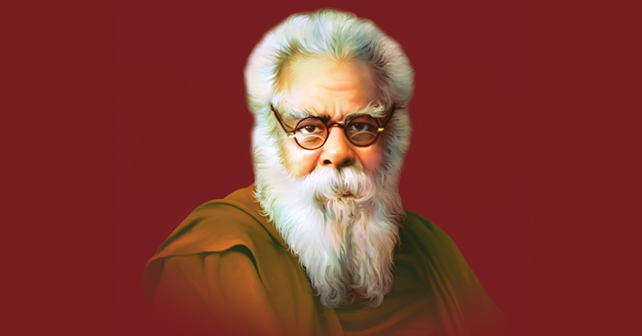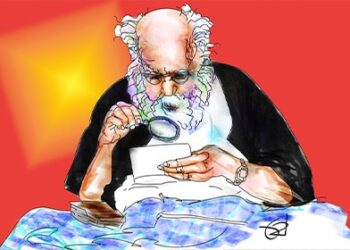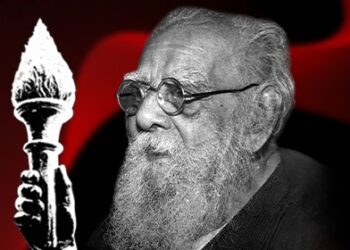In his thought provoking editorial in ‘Kudi Arasu’ weekly dated 07-05-1949 Periyar commended ‘Thirukkural’ as a great rationalistic work of the renowned Tamil sage Thiruvalluvar. It is a world of wisdom in print according to him. All the 1,330 couplets in it offer a microcosmic view of our macrocosmic world. Though Periyar does not agree with the central idea of some of the couplets he accepts and admires most of them which are enough to hail ‘Thirukkural’ as a rationalistic work. Let us see how he probed into a few chosen couplets and proved it.
A rebuttal to Aryan myth
‘Thirukkural’ was composed about 2,000 years ago when there was widespread Aryan domination. Aryan gods, customs, scriptures and mythologies were all blindly accepted by gullible people. Brahmins of the Aryan race called themselves ‘Andhanars’, which means pious, righteous people who love all living beings; but Brahmins were not so. Hence, Thiruvalluvar had to explain who real ‘Andhanars’ are.
“antaṇar eṉpōr aṟavōr maṟṟvvuyirkkum
centaṇmai pūṇṭoḻukalāṉ”
– Couplet No.30
‘Andhanars’ are those who fight for prevention of cruelty towards animals and strive for their ethical treatment. It does not denote any particular caste, but the people who empathise with all living beings and live with the objective of restlessly conserving them. Hence Brahmins should not call themselves ‘Andhanars’. No one should call them so in speech or writing.
Birth-based superiority
It was believed long ago that every Brahmin was superior by his birth and deserved veneration, however wicked he might be. Sages and saints ignored even the unbridled lust of a Brahmin and overlooked his incestuous activities. They blindly eulogised every Brahmin.
“maṟappiṉum ottukkoḷalākum pārppāṉ
piṟappoḻukkam kuṉṟak keṭum.”
– Couplet No.134
Through this couplet he says, if the conduct and character of a Brahmin are despicable he is certainly contemptible. If character is lost, everything is lost. No man is to be judged by his birth or caste. This is implied by Thiruvalluvar. According to him one who has mastered books of worldly wisdom may forget what he learned and recollect later in life to retain his nobility but a cultureless man would be condemned for ever, however superior he may be by his birth.
Cruel ‘animal sacrifices’
Thiruvalluvar condemns animal sacrifice in rituals. Sometimes fanatics roast animals alive and pour various things on the fire. They call it ‘yagya’ to please their gods.
“avicorintāyiram vēṭṭaliṉ oṉṟaṟ
vyircekut tuṇṇāmai naṉṟu.”
– Couplet No.259
Through this couplet Valluvar says, abstaining from the consumption of animal flesh is far better than thousands of rituals torturing animals and wasting manpower, money and material. This couplet depicts the rationalist outlook of Valluvar. He vehemently condemns superstitions and blind belief in meaningless rituals. He provokes us to imbibe scientific temper and question stupid outdated customs. It is clear as crystal that Valluvar advocated the spirit of inquiry which makes us complete men and women.
Accept or reject
I would never say that all the couplets are acceptable to me. Many are similar to our policies and principles and some are not. I skim deeply and take for myself those which resemble my thought. I agree to disagree with the rest. My request to all the readers is just that. Convince me if I am wrong. If you realise you were wrong, correct yourself and follow me. Do not blindly accept all that I say. I shall be the last person to compel you. Identify the right and the wrong by introspection; by examining yourself. Now let me proceed with my probing work.
Destiny and divine powers
Our Dravidar Kazhagam denies the existence of god and the fabricated powers of the stars and the planets. We believe, destiny is a myth. Heaven and hell are mere illusions invented by the Aryans to threaten gullible people. There is no former life or after life. Salvation, redemption and retribution are all senseless. Valluvar has rebutted them all by his couplets.
“irantum uyirvāḻtal vēṇṭiṉ parantu
keṭuka ulakiyaṟṟiyān.”
– Couplet No.1,062
A man’s poverty is not ordained by god.If he has to seek alms door to door and street to street that could be because of various other factors, not his destiny. No divine power is responsible for our pains and pleasures. The rulers who ignore the poverty of the citizens would one day or the other endure the same when nature takes its own course.
Fabricated gods and goddesses
Aryans fabricated them to pull wool over the eyes of ignorant people. All such elements of divinity are soaked in misconduct, adultery, incest and various other obnoxious activities. Valluvar has nothing but contempt for such fictitious characters.
“tēvar aṉaiyar kayavar avaruntām
mēvaṉa ceytoḻukalāṉ.”
– Couplet No.1,073
The couplet leads to a disillusionment in this respect. Gods and goddesses fabricated by the Aryans are not at all worthy of worship according to Valluvar.
The powers of nature
Nature is invincible according to Valluvar. He believed that it always takes its own course. Everything on earth is a gift of nature. Belief in nature is the sign of rationality. Our birth and death and the entire human struggle for existence depend only on the cyclic act of nature.
“vāṉniṉṟu ulakam vaḻaṅki varutalāl
tāṉamiḻtam eṉṟuṇaraṟ pāṟṟu.”
– Couplet No.11
Rainwater is the source of existence for all the living beings on earth. It is an elixir of life for us all. It is an ideal antidote for all human beings. It is a great gift of nature; not of any so-called gods or goddesses.
The greatness of rainfall
Rainfall vitalises the entire world. It helps us grow food. It helps us all exist. If nature deprives us of rainfall, we would all be doomed for ever. A rationalist would admire this great gift of nature.
“ciṟappoṭu pūcaṉai cellātu vāṉam
vaṟakkumēl vāṉōrkkum īṇṭu.”
– Couplet No.18
No one would be able to felicitate his leaders and organise events to honour them if there is no rainfall, because our existence itself would be threatened if there is no water. Unless people exist, how can any event be held? Valluvar glorifies the power of nature.
“tāṉam tavam iraṇṭum taṅkā viyaṉulakam
vāṉam vaḻaṅkā teṉiṉ.”
– Couplet No.19
This couplet too stresses with a rationalist outlook that only Nature matters in our life. No charity work is possible; no act of benevolence is possible if rainfall suddenly fails. Without water our existence is impossible.
A matter of relevance
It is ridiculous to argue that ‘Thirukkural’ is relevant to all the eras. Its antiquity prevents it from being suitable to every century. Life and society were different 2,000 years ago. The thoughts and codes of conduct which suited that era would not be relevant to the present era. Only those couplets which are still relevant to our society, should be highlighted to support our views and policies, especially self respect, rationality, scientific temper, women empowerment, caste eradication and social justice. For instance, Valluvar was against birth-based disparities and inequality caused by discriminations.
“piṟappokkum ellā uyirkkum ciṟappovvā
ceytoḻil vēṟṟumaiyāṉ.”
– Couplet No.972
We are all equal to one another by birth. No one is superior or inferior to anyone. People are recognised and identified only by the kind of labour they are involved in, and the outcome of their work.
Success – the fruit of labour
Valluvar has stressed the truth that our serious, sincere and systematic labour would surely secure supreme success.
“teyvattāṉ ākāteṉiṉum muyaṟcitaṉ
meyvaruttak kūli tarum.”
– Couplet No.619
To believe that our success and failure are ordained by god is the height of ignorance. Everything depends on the volume and quality of our work. Our sweat would never be wasted. Our hard work would yield fruitful result one day or the other.
Inevitable changes
Long ago it was taught that covetting the property of others is theft which is a crime. But people who accumulate more than what they need are also in a way criminals. Hence to seize wealth from the “haves” and offering it to the “have nots” is a social responsibility in my view. Systems of thought such as Socialism and Communism preach the value of equality in society. Modern men should change with the passing of time and accept new views and thoughts. similarly, we can ignore some couplets in ‘Thirukkural’ which are outdated and impracticable. The number of such couplets is of course negligible.
Embedded rationality
Rationalism underlies ‘Thirukkural’. Rationality is embedded in it. It is in a sense a satirical attack on many of the Aryan blunders. Some Aryan fanatics may come out with erroneous interpretations in accordance with their outdated codes and conventions, but we have to interpret correctly and paraphrase each couplet without distorting the central idea in it. I wish to conclude by stressing that ‘Thirukkural’ is a rebuttal to Aryan thoughts and is undeniably a rationalistic work which makes us enter a new world of wisdom.
Source: ‘Kudi Arasu’ Editorial – 07.05.1949)
Translated by: M.R. Manohar






